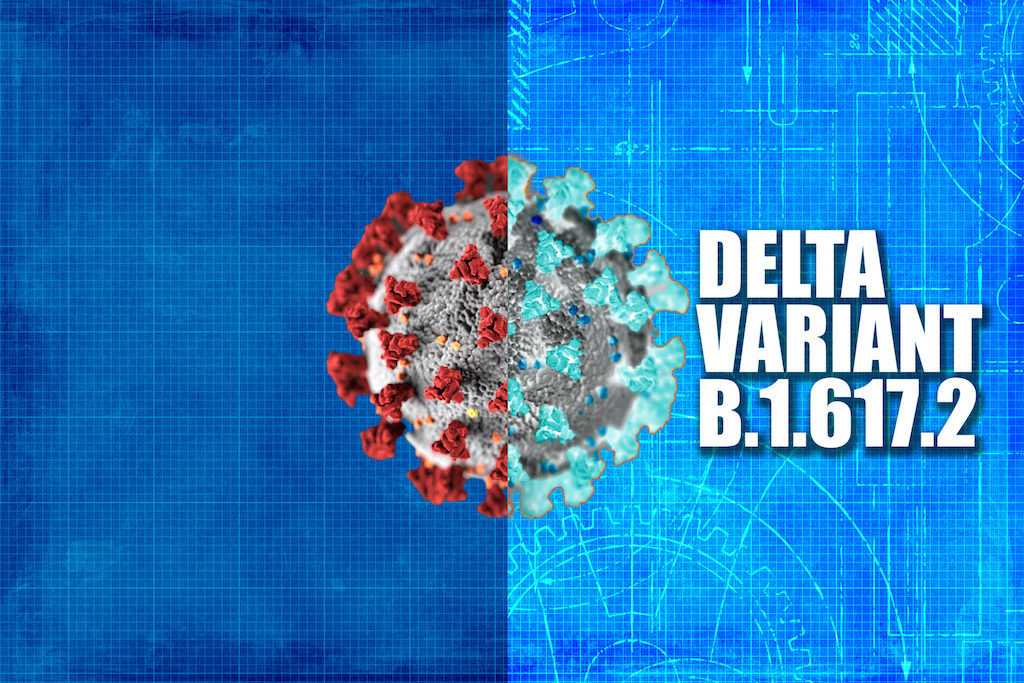With a pandemic of COVID-19 continuing worldwide, experts in public health are tracking the number of mutations and variations which are more infectious or fatal than the initial strain. Viruses continuously evolve to adapt and live, and there are variations when one or more strains have mutations that differ.
According to the recent surveillance data from the Centers for Disease Control and Prevention, Delta is currently the leading variation in America representing 51.7 per cent of confirmed COVID-19 samples.
The Delta variation COVID-19 is the “transmissible” of the variants found so far and it is quickly disseminated among unimpaired people, says WHO CEO Tedros Adhanom Ghebreyesus. This is initially reported in India and is now detected in numerous countries worldwide. Although Pakistan’s COVID-19 case count is downwards, the delta variant has become an urgent problem.
Continue to learn all about the Delta Variant of Coronavirus.
What is the Delta Variant of Coronavirus?
According to the CDC, the Delta version, sometimes called B.1.617.2, may readily spread. The strain contains spike protein mutations which make it easier for human cells to get infected. This means that if people catch the virus and disseminate it more easily to others it might be more infectious. Now it’s the main strain in the United States.
Indeed, according to the Washington Post, experts indicated that the Delta form is around 50 per cent more infectious than the U.K. Alpha type. Alpha, also known as B.1.1.7, was already 50% more infectious than China’s first coronavirus in 2019.
Public health specialists consider that, in comparison with one or two other individuals through the first strain of Yale Medicine, an average person infected with Delta spreads to three or four additional people. Although investigations continue to take place, the Delta version can also avoid protection against vaccinations and some COVID 19 therapies.
What is the Delta Plus Variant?
The version of Delta Plus, often referred to as B.1.617.2.1 or AY.1, is regarded as a subvariant in the Delta version. It contains a mutation that makes it possible for the virus to target lung cells faster and possibly evade vaccinations.
In the U.S., U.K. and almost a dozen other nations, Delta Plus was first detected in India. Indeed, it has been classified by the CDC and by WHO as a variation of concern.
Where did the Delta Variant of Coronavirus Emerge from?
First in India in December 2020, the Delta variant was found and resulted in significant epidemics. According to a CDC tracker, it then spreads quickly and is already recorded in 104 countries.
Delta is the prevalent form of coronavirus in the United States, the United Kingdom, Germany and other nations from early July. In the United Kingdom for example, according to public health England, the delta variation currently comprises over 97 per cent of new COVID-19 cases.
What are the indications?
The effects are related to those of the original type of coronavirus and other forms of sore throat, such as respiratory infection, headache, fever.
Concurring that, according to data from the ZOE COVID symptoms survey, COVID-19 patients in the UK indicated that some indications for Delta are a bit better. Cough and smell loss appear to be less prevalent. Headache, sore throat, rushed nose and fever appear to be more prevalent.
Delta Variant – A More Harmful Coronavirus
Researchers still follow the data to see how dangerous it is. According to a recent study published in The Lancet, the Delta variation, based on hospitalizations in the UK, is more likely to result in hospitalisation and mortality, especially among non-vaccinated persons.
Effect on Vaccinated People
Scientists are investigating how the delta variation might induce incidences of breakthrough or infections incompletely vaccinated individuals. They appear uncommon thus far.
In an early analysis, two doses of the Pfizer or Moderna vaccine seemed to be 88% disease-effective and 96% Delta-effective, according to Public Health England. The non-U.S. approved AstraZeneca vaccine was around 60 per cent disease effective and 93 per cent hospital effective.
Johnson & Johnson also announced the effectiveness of their single-shot Delta vaccine, which researchers believe is similar to the results of AstraZeneca. The Johnson & Johnson vaccination has, however, reduced considerably over time, indicating that those who have had a J&J shothttps://www.fact-file.com/2020/12/12/how-effective-are-the-new-covid-19-vaccines/ could require a booster injection in the study posted on a pre-print server on July 19 – meaning that it was not evaluated by peers.
Vaccine producers are now studying booster injections to find out whether they may protect them better against the Delta version and other variations in the months to come. According to the media, Pfizer stated that in August he will be seeking FDA approval for the Booster Dose.
Effect on Unvaccinated People
Yale Medicine reports that people who have not been fully COVID-19 immunised are most in danger. In the USA, low-vaccine areas in MidWest and South States, including Missouri and Arkansas, have witnessed a boom. In mountain states, such as Wyoming, outbreaks were also observed.
Children and younger adults not immunised may also be vulnerable. According to research released by Imperial College London, in the UK, children and unvaccinated people under 50 years of age have been 2.5 times more likely to get infected by Delta.
What is the situation of the Delta version in the USA?
The Delta variety is available in all 50 countries and is currently 52 per cent new infections in the United States, according to The Washington Post. It accounts for almost 80 per cent of new cases in Iowa, Kansas, Missouri and Nebraska.
Officials of public health are still not clear how the Delta variable will ultimately affect the US, however according to NBC News it has led to increased instances worldwide. In Australia, Bangladesh and South Africa, lock-outs and curfews were implemented and additional travel restrictions were imposed in Germany, Hong Kong and Taiwan to decrease the numbers of flights from widely transmitted nations.
How can You Remain Safe?
While the Delta variety is now a modest problem in the World, being vaccinated as soon as feasible is extremely crucial. Full immunisation is efficient in preventing double mutation.
Note that all safety measures must be followed with complacency even after immunizations.
Fitting nose and mouth masks should be used in public at all times. If you can, dual mask. Use hand sanitisers and hand washers regularly.
Rest assured of social distance and not going to busy areas, if needed. Do not use cash; go as far as feasible for digital payments. Don’t eat or drink publicly, as your mask will need to be removed.









